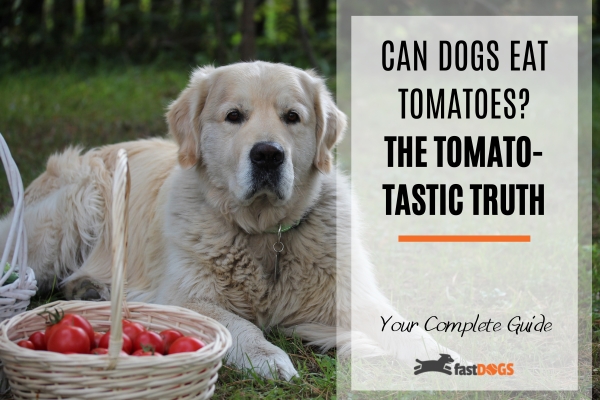Can Dogs Eat Onions? Why Onions and Dogs Just Don’t Mix
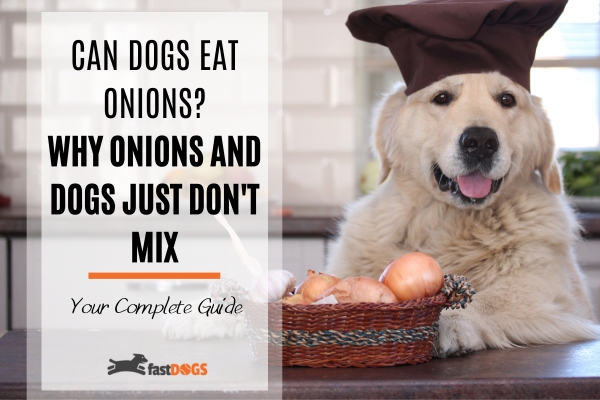
The humble onion, a staple ingredient in many kitchens, adds depth and aroma to countless recipes. Its versatility and delicious flavor make it a beloved vegetable in culinary circles.
However, while it may be a must-have in human cuisine, it’s important to consider whether it’s safe for our furry friends. Dogs possess a curious nature, and with their love for food, it's natural to wonder — can dogs eat onions?
Let's take a closer look at the potential risks of feeding onions to dogs.
Can Dogs Have Onions? Contents
How Much Onion Is Toxic to Dogs?
What To Do if Your Dog Eats Onions
Can Dogs Eat Onions?
It’s a big, fat, no.
Onions contain compounds that are toxic to dogs. Other members of the allium family, such as leek, garlic, chives, and shallots, are also toxic to dogs.
So, to help you, we've put together a roundup of all those questions you may have concerning this root veggie and your canine:
Can Dogs Eat Green Onions?
As much as we love to add flavorful herbs like green onions and chives to our dishes, these veggies are still from the Allium genus. Hence, dangerous to our furry friends.
And, if you’re wondering, ‘can dogs eat red onions?’ — the same applies. And, that goes for yellow or sweet. In short, stick to dog-friendly herbs like parsley or basil to add a little extra zest to your pup's meal.Can Dogs Have Onion Powder?
No, dogs shouldn’t be given onion powder.
Moreover, onion powder is often used as a flavoring agent in various food products, which may also contain added salt and preservatives that are unhealthy for dogs.
Therefore, check the ingredients labels before giving your pooch something from your plate.
Can Dogs Eat Onion Rings?
While onion rings may be a delicious treat for humans, they aren’t suitable for dogs. In fact, they are not just "ruff" for your pup's health but can actually be dangerous.
Stating the obvious, onion rings contain onions — which are toxic to dogs — not to mention, they’re often high in fat and calories. This can lead to obesity and other canine health issues.
Are Cooked Onions Bad for Dogs?
Yes, they are, and we're not just shedding tears for nothing!
Despite the delicious aroma that wafts from sizzling onions on the stove, dogs should never be allowed to partake in this culinary delight. Cooking onions doesn't magically make them safe for dogs to consume.
In fact, it can make them more concentrated and potentially even more toxic.
So, while you might be tempted to toss a few pieces of sautéed onion to your pup, remember that even small amounts can cause harm.
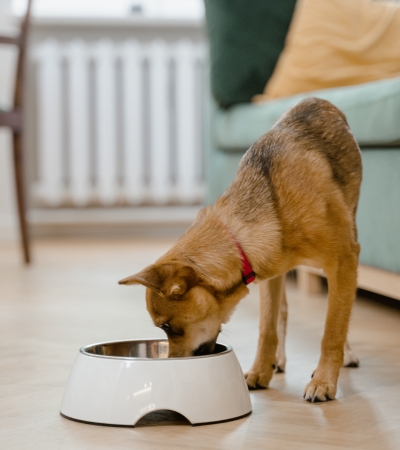
Why Are Onions Bad for Dogs?
Onions contain a poisonous-to-dogs chemical — as does garlic, shallots, chives, and leeks — known as N-propyl disulfide. It’s toxic to canines because they lack the enzyme necessary to process this. When ingested, N-propyl disulfide attacks red blood cells, causing damage or destruction. This means they’re unable to carry out the all-important function of moving oxygen around the body efficiently.
If the oxidative damage persists — at best, your dog can develop hemolytic anemia (the reduction of red blood cell count at a faster rate than their reproduction). At worst, organs could fail, and your pooch could die.
How Much Onion Is Toxic to Dogs?
One of the reasons onions pose such a threat to dogs is that it takes only a small amount to cause serious problems in our furry friends.
For instance, if a dog ingests more than 0.5 percent of what it weighs in onions in one sitting, they may experience toxicity. What’s more, the severity of symptoms depends on the size of the dog.
So, for example, a:
Chihuahua weighing 10 pounds would only need to eat 0.8 ounces (23 grams).
Mastiff with a weight of 150 pounds has a threshold of 12 ounces (340 grams).
As you can see, the Mastiff may not be affected by a small amount of onion. But for the Chihuahua, it could be a serious health threat.
However, this percentage threshold can be reached quite easily, so even a small amount of onion can have detrimental effects on a dog's health. Therefore, it's crucial to keep onions and other allium veggies away from dogs, especially in areas that are easily accessible to them.
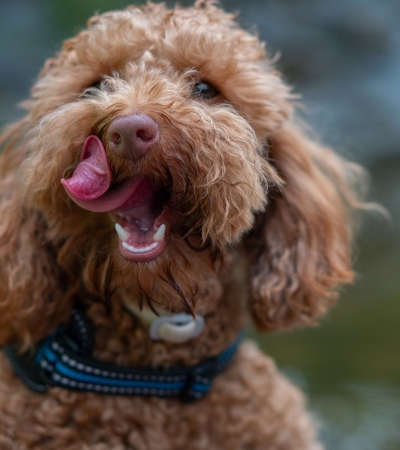
What To Do if Your Dog Eats Onions
Symptoms of onion poisoning in dogs generally appear within 24 to 48 hours — these include:
Diarrhea.
Vomiting.
Abdominal pain.
Red or brown urine.
Refusal to eat.
Pale gums.
Inability to exercise.
Elevated heart rate.
Lethargy or weakness.
Increased respiratory rate.
Stumbling or loss of balance.
Should your canine companion exhibit any of the above signs, you must get in touch with your vet.
The course of treatment may include inducing vomiting or administering other remedies, contingent upon the gravity of the situation. In the event of particularly dire circumstances, your furry friend may necessitate a blood transfusion to replenish their depleted red blood cells.
Remember, prevention is always the best medicine.
To avoid future episodes of onion toxicity, be mindful of what foods you give to your dog and keep any onion-containing dishes far from their inquisitive noses. By taking these simple precautions, you can help ensure your furry friend stays healthy and happy for years to come.
Final Thoughts
As much as we may love to share our food with our furry friends, it's crucial to remember that some foods can be toxic to them, and onions are one of them. Whether it's raw, cooked, dehydrated, or powdered, onions and all other allium veggies should never be fed to your dog.
Even a tiny amount can cause severe anemia and, in extreme cases, death. As responsible pet owners, we must ensure that we're not inadvertently putting our dogs at risk by keeping all forms of onions and other harmful foods out of their reach.
So, having shed some light on — can dogs eat onions? Remember, while this vegetable may be delicious for us, they're a big no-no for our furry friends.
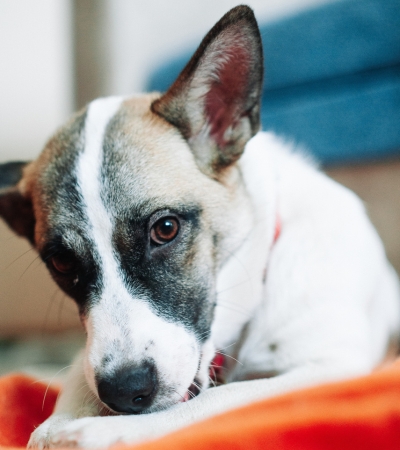
Can Dogs Have Onions? FAQs
Will a Small Amount of Onion Hurt My Dog?
Yes. Onions contain a toxic substance called N-propyl disulfide, which can damage your dog's red blood cells and lead to a condition called hemolytic anemia. The amount of onion that can cause toxicity varies based on the size of your dog and the amount consumed. But any amount of onion should be avoided.
How Quickly Can Onion Toxicity Occur in Dogs?
The severity of toxicity can depend on a variety of factors, including the size and weight of the dog, the amount of onion consumed, and the overall health of the animal. However, in general, the symptoms of onion poisoning can begin to manifest within 24 to 48 hours of consumption.
How Long Does Onion Poisoning Last in Dogs?
Onion poisoning in dogs can last for several days to a few weeks, depending on the severity of the poisoning and the treatment received.
What if My Dog Ate Onions?
Seek veterinary attention immediately.
Your vet may induce vomiting or use other methods to remove the onion from your dog's system. Treatment for hemolytic anemia may also be necessary if your dog has ingested a large quantity of onion.
Can Dogs Develop an Intolerance to Onions?
No. Onion toxicity is a result of the toxic substance called N-propyl disulfide, which cannot be tolerated by dogs at any level.
Can Onions Kill Dogs?
While dogs may recover from mild exposure to onions or garlic, severe poisoning can be life-threatening, especially if left untreated. Therefore, if you suspect your dog has consumed a large amount of onions, it's essential to seek immediate veterinary care, even if no symptoms are present.
What if My Dog Ate Onions?
Act promptly. Inducing vomiting within the first hour can help, but if it's been longer, vomiting and a dose of activated charcoal may be beneficial. There's no antidote for the toxins that enter the bloodstream, so immediate veterinary care is crucial if symptoms occur.
Can Dogs Eat Tomato?
Yes, dogs can eat tomatoes, but it's essential to be cautious, as some parts of the tomato plant are toxic to dogs. The ripe fruit itself is generally safe for dogs to eat in small quantities, but it's high in sugar and can cause digestive upset in large quantities.

